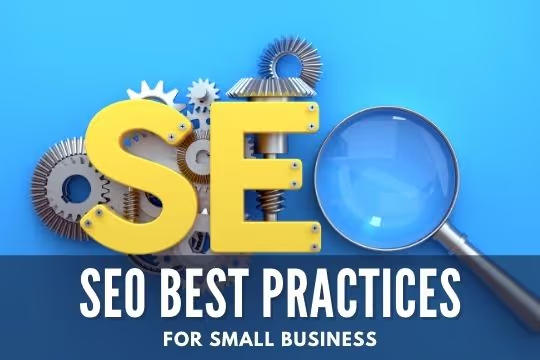

For many small businesses, hiring a professional seems like the best way to handle advertising products and services online. After all, the pros can easily help you rank higher and get more online traffic. This will ultimately translate to more sales and net gains. While this is true to some extent, there are many things that you can do to help optimize your website for Google, DuckDuckGo, Bing, and other search engines.
Below are some of the best SEO practices that you can use to drive traffic to your small business website. You can also contact E-Marketing Associates if you need assistance. Before you know it, you can start seeing your page climb to the top as you drive more organic online traffic!

SEO stands for search engine optimization. SEO involves a long-term process that improves where your site will rank when someone searches for a service or product you offer. Your business website’s search engine result page (SERP) rank may also vary from search engine to search engine. It is important for businesses to fine-tune their website using SEO tactics to ensure plenty of regular online traffic. The earlier you start optimizing your website and its internal pages for search engines, the faster you'll be able to see organic, targeted traffic on your site.
SEO involves optimizing your website to ensure that online search engines will be able to understand what your site’s pages contain. This helps naturally improve your non-paid (organic) traffic and online visibility. The more targeted traffic you drive online, the more likely you are to engage your target audience and make sales. This is known as SEO, targeted, or smart lead conversion.
So how does it all apply to small businesses? Well, for small businesses, it’s all about targeted SEO to a specific audience. The entire process of building a solid SEO strategy can take months to become effective. However, there are a few specific techniques that small businesses can use to optimize online content. Hiring professional e-marketers and using DIY SEO strategies can help small businesses improve their ranking online. Ultimately, this will drive targeted traffic to your site, whether it is big or small.
The best SEO strategies are worked into the very structure of a website. Consider how your site should be built based on your target audience. To do this, it can be smart to learn about the psychoanalytic theory of consumer behavior. After all, you aren’t trying to reach everyone in the world. Instead, you want to focus your time, money, and energy on your target demographic.
Have a strategy in mind before writing a single line of code. If you are hiring a web designer, be sure they understand the demographics that you are trying to reach. You want to make sure your URL structure ties cohesively into the structure of your site as well. Additionally, never underestimate the importance of internal linking. Internal links allow you to effectively distribute link equity throughout your website. This can help your site rank better for certain keywords and links with anchor text.

As you build your website, be sure to leave plenty of room for internal linking. Also, make sure to leave room for outbound links. If a link is relevant and adds value to your site, it may be useful. However, unrelated outbound links should be left off of your web pages. Be sure to analyze your competitors and use Google Keyword planning tools as you build your website as well. Set up your site for the optimal user experience, and be sure that everything translates well with Google Analytics.
Finally, be sure that your account is set up with the Google Search Console and Bing Webmaster Tools. From here, you will be able to submit your sitemap. If you haven't already created a sitemap, you should definitely make one. This will ensure that your site is indexed properly. If you are hiring a web designer, be sure that they're utilizing these resources as well.
• Know your target audience
• Use cohesive URLs
• Make space for internal links
• Use relevant outbound links
• Set up Google Analytics
• Focus on user experience
• Create a sitemap

The right keywords can definitely help small businesses rank higher. Keywords are words or phrases that consumers are likely to use in a search engine. For example, if you sold coffee, keywords such as espresso, best coffee, delicious coffee, online coffee order, etc., could be relevant to your site.
Keyword research is the process of discovering the perfect keywords and keyphrases for your business. Then, you can create content using these keywords to improve your SEO strategy and ultimately boost your page rank.
Keywords come in all shapes and sizes. There are popular keywords, related keywords, key phrases, and long-tail keywords to choose from. It is best to choose keywords that will fit with the website content of your small business. Tools like Ubersuggest are popular when conducting keyword research.
As you identify the best keywords to choose options that tie in with the content of your website but are also easy to rank for. For instance, the keyword “best coffee” could be very difficult for a small business to rank on the top SERPs. Most likely, a large company is paying big money to ensure that they will rank high for a phrase like this. However, a keyphrase like “coffee in Cincinnati” might be very easy to rank for. If your Target demographic was located near the Cincinnati area, this would be a good key phrase to use.
After you have identified the highest-ranking targeted keywords, you can start using them within the pages of your website. Many websites do this through posts or blogs. Weekly blogs allow you to organically integrate a range of high-ranking, frequently searched keywords. Through time, small business owners can use targeted keywords to simultaneously improve the quality of the content on their website and their page rank.
Keywords can be used in the title tags of your blogs or directly on the main pages of your site. Keywords can attract customers from local search pages and may also cast a wider net to reach new customers who aren't necessarily in your area. Potential customers will be far more likely to discover your website if it comes up at the top of the search pages when they Google a specific term or phrase. You may also want to hire e-marketing professionals to help you with this process.

It is also important to make sure that your website is optimized for smartphone use. More people are using their phones to surf the web than ever before. In 2018, smartphones generated over 50% of total online traffic. Today, that number is even higher. Your small business will need to keep up with consumer behavior to rank well online. As such, mobile site optimization is essential.
When implementing SEO best practices for small business owners, focus on your target demographic, keep your user experience excellent, and take advantage of the organic search benefits of keyword research and implementation.
Whether you are trying to generate more leads, sales, or rank better on the search engines, the pros at E-Marketing Associates are here to help your small business grow with expert website design, SEO, social media management, and reputation management software. That way, you can compete with the big guys on a small business budget! For more tips on how to grow and manage your small business, subscribe to the emarketing newsletter!
SEO stands for search engine optimization; it helps your site appear higher in search results, driving targeted, unpaid traffic. For small businesses, better visibility means more potential customers, leads, and sales without large advertising budgets.
SEO is a long-term strategy. With consistent optimization, many small businesses notice initial improvements in three to six months, while competitive keywords can take longer. Results depend on site quality, competition, and how regularly you refine content.
Focus on keywords that match your products, services, and location but have manageable competition. Long-tail phrases like 'coffee shop in Cincinnati' often perform better for small businesses than broad terms like 'best coffee.' Use research tools to choose wisely.
Search engines prioritize mobile-friendly sites because most searches happen on phones. If your pages load slowly or display poorly on mobile, rankings and user experience suffer. Responsive design keeps visitors engaged and helps your site meet Google's mobile-first indexing standards.
Many essential SEO tasks—keyword research, content creation, sitemap submission, basic analytics—can be handled in-house with free tools. However, hiring professionals can speed progress and manage technical complexities. Choose the approach that fits your budget, time, and expertise.